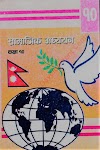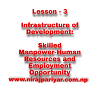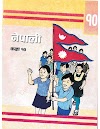Class 12 English Guide
5. Soft Strom By:- Abhi Subedi
The poem ‘Soft Storm’ is written by a popular
poem Abhi Subedi. He is the most popular personality in the academic field of
Nepal. He has taught more than 44 years in different universities and equally
contributed in the field of literature by writing several poems, essays,
stories and dramas in both Nepali and English languages.
This poem presents the speaker of the poem as a rebel in the society. He
doesn’t like the useless and cruel activities of the society. This poem
indirectly attacks the bad-practices of Nepali society very minutely. The poem
is a bit longer than other poems of this book. It is written in free verse. It
has a beautiful combination of the description between nature and society.
The poet describes the
environmental disorder in Nepali society in the first stanza. In the same way,
he makes a correlation of those natural disorders with the practices of human
society by using the words like politics, postures, rituals and reasons. In the
last line of the first stanza, the poet uses a term seamless city that refers
to the problem less or unified city of the past. It's no more than the recall
of the time where there were very fewer social problems in the society.
In the second stanza, he
gives the reference of homeless children who are crying in Thamel. They are
also crying because of hunger under the bat-bearing trees of Kesharmahal. He
shows the bitter reality of a developing country through the lines. It is a
serious social problem of the nation which should be solved at any cost. In the
same stanza, he uses the term 'unwedded gardens of history' from which he wants
to refer the past flourished incidences of the society which literally means
lawless, disturbed and chaos situation created by social and political
domination in the Nepalese society.
Similarly, in the third
stanza, he talks about a hopeless child carrying a radio around his neck who is
crying to find his mother. This phrase indicates a painful condition of street
children. There is also a reference of a man who was beaten badly for no
reason. Likewise, in the poem, he presents an injured man with a blood-stained
shirt crying for humanity. It reflects the situation of lawlessness, which
ultimately makes the speaker become rebellious against the system.
In the remaining stanzas the speaker has also presented the disturbed
courses of our society and the courses of our nature. Dominated person can’t
speak because his voice is locked. It is like the game of hide and seek. The references
rain tears, sun laughter, deforested land, rhododendron blooming in winter,
songs of the sad birds etc. have shown the degradation of social values and
environmental conditions. Selfish and lawless activities of present people have
disturbed and spoilt earth and the creatures of the earth. In the final stanza,
the speaker concludes it by stating the desire for freedom for him as well as
other creatures of the earth. He favours the beautiful, lovely and calm sky
with sweet music of soft storm.
Answer the following questions.
a. When does the speaker grow soft? Enlist
the occasions when he grows soft.
➜ The speaker
grows soft on various occasions. They are enlisted below:
- ·
After he
heard the tumult(noise)
- · When homeless children in Thamel cried with hunger
- · When he returns from the melee(disturbance)
- · When he saw a helpless child carrying a radio around his neck
- · When he saw a blood-stained shirt of a man and so on.
b. What do you understand by ‘this seamless
city’?
➜ By
'this seamless city', I understand a city where people can wander around
freely, free of social problems, and experience
the true fruits of freedom and happiness, unbiased.
c. Describe the poor children portrayed in
the poem.
➜ Under
the bat-bearing trees of Kesharmahal in Thamel, poor homeless and parentless children
cry out in hunger and poverty. They are deprived of their constitutionally
guaranteed fundamental rights.
d. What do you understand by ‘the unwedded
gardens of history’?
➜ I
understand the flourished(strong or pure) incidents in the past, as well as the
society's ignored culture and traditions, which literally translates to a
lawless, serious condition in Nepalese society caused by social and political domination.
e. Why was the forlorn child wailing (
crying)?
➜ The
forlorn child was wailing to find his mother in the street.
f. What do you understand by ‘soft storm’?
➜ I
understand Abhi Subedi's inner disturbing feelings as a result of a lawless
society and chaotic atmosphere by 'soft storm,' the two words combined by Abhi
Subedi to title his poem. A storm denotes bad weather, but when combined with
the word "soft," it signifies the bad times that the poet observes in
today's society.
g. Why does the speaker call our time ‘mad
time’?
➜ Because
our time in current society is not under the control of the constitution or the
law of the nation, the speaker calls it "mad time." Corruption,
favouritism, sociopolitical unfairness among the people and environmental
degradation are all prevalent in society, according to him.
h. What does the speaker want to do in “hard
times”?
➜ In "hard times", the speaker wants to melt like a rainbow.


.png)



.png)



.gif)



0 Comments